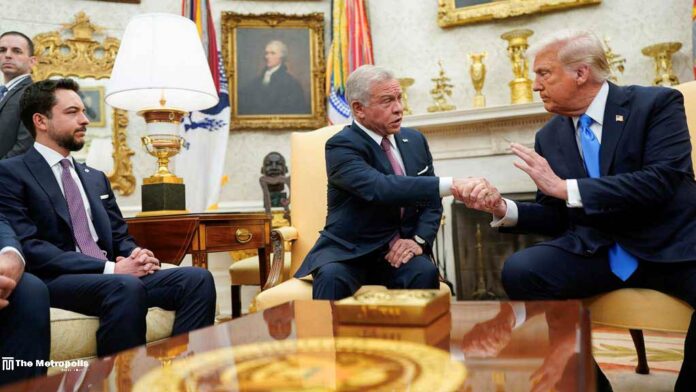On Tuesday, Donald Trump urged Jordan’s King Abdullah to accept Palestinians who would be permanently displaced under his plan for the U.S. to take control of Gaza. However, the Jordanian king firmly rejected any such move.
Speaking alongside King Abdullah at the White House, Trump made it clear that he was committed to his vision of relocating Gaza’s war-stricken residents and transforming the devastated territory into what he described as a “Riviera of the Middle East.”
Trump’s proposal has sparked outrage in the Arab world, as it prevents Palestinians from returning to their homes in the enclave, which has been heavily damaged by Israeli military operations.
“We’re going to take it. We’re going to hold it, we’re going to cherish it. Eventually, we’ll get it running, creating a lot of jobs for people in the Middle East,” Trump said in the Oval Office, insisting that his plan would bring stability to the region.
King Abdullah later reaffirmed Jordan’s “steadfast position” against the displacement of Palestinians from both Gaza and the occupied West Bank, which borders Jordan.
“This is the unified Arab position,” he posted on X, emphasizing that rebuilding Gaza without displacing its residents and addressing the dire humanitarian crisis should be the top priority.
Despite Abdullah’s firm opposition, Trump maintained that Jordan and Egypt would eventually agree to shelter displaced Palestinians, citing their reliance on U.S. economic and military aid.
“I believe we’ll have a parcel of land in Jordan. I believe we’ll have a parcel of land in Egypt,” Trump said. “We may have someplace else, but I think once our discussions are done, we’ll have a place where they’ll live happily and safely.”
U.S. Aid and Diplomatic Pressure
While Trump suggested he could consider withholding aid to Jordan, he insisted he was not using it as leverage.
“We provide a lot of money to Jordan and Egypt—quite a lot to both. But I don’t need to use that as a threat. I think we’re beyond that,” he said.
King Abdullah has consistently rejected any plans to annex Palestinian land or forcibly relocate its residents. He was the first Arab leader to meet with Trump since the controversial Gaza proposal was introduced.
Although their meeting appeared cordial, Trump’s comments placed Abdullah in a difficult position, given the deep sensitivity in Jordan regarding Palestinian refugees’ right to return to lands they fled during the 1948 war surrounding Israel’s creation.
At one point, Trump seemed to prompt Abdullah into agreeing to take in displaced Palestinians. The Jordanian king responded cautiously, saying he would do what was best for his country but confirmed that Jordan would accept 2,000 sick children from Gaza for medical treatment—an offer that Trump praised.
Arab nations are expected to present a counterproposal to Washington, with Abdullah stating, “The goal is to find a solution that works for everyone.”
Jordanian Foreign Minister Ayman Safadi later told state-owned al-Mamlaka TV that Egypt was leading an Arab effort to rebuild Gaza without displacing its population.
Jordan’s Concerns and U.S. Aid Freeze
Jordanian officials had sought to avoid a public confrontation where Trump might pressure the king. However, unplanned remarks inside the Oval Office led to direct exchanges on the issue.
The meeting was attended by the king’s son, Crown Prince Hussein, Foreign Minister Safadi, U.S. Secretary of State Marco Rubio, and other officials. Abdullah later met with a bipartisan group of U.S. senators, including Republican Majority Leader John Thune.
Jordan, home to over 2 million Palestinian refugees within its 11-million population, has long been wary of any changes that could alter its demographic balance.
Amman is also grappling with Trump’s recent decision to pause U.S. foreign aid for 90 days. While Israel and Egypt received waivers, Jordan’s annual $1.45 billion in aid remains frozen as part of a broader review by the Trump administration.
Rising Tensions Over Gaza and Ceasefire Uncertainty
Trump’s proposal has further complicated an already fragile regional situation, including an uneasy ceasefire between Israel and Hamas.
On Monday, Hamas announced it would halt the release of Israeli hostages, accusing Israel of violating the ceasefire agreement. In response, Trump suggested canceling the truce if Hamas did not release all remaining hostages taken during the October 7, 2023, attack by Saturday.
“If they don’t do it, all bets are off,” Trump warned, expressing doubt that Hamas would comply.
A recent Reuters/Ipsos poll conducted from February 7-9 showed that 74% of Americans oppose the U.S. taking control of Gaza and relocating its Palestinian population. The poll also revealed a split among Republicans, with 55% against the idea and 43% in favor.



